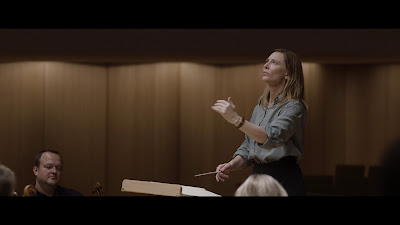 |
| Cate Blanchett Tár |
(Spoiler Alert: This review gives away a major plot development)
Mahler's Fifth Symphony which had formerly claimed two movie outings, now claims a third with Todd Field's Tár, each one with very different aims and intentions. The first, at least to my knowledge was Visconti's turgid Death in Venice from the Mann novella appealing to the tragic queen in us all, with Dirk suffering for his art under a ton of melting mascara, pancake and hair dye with which Visconti indulges, fatally for me, his overriding obsession with the decorative minutiae of the film down to the doorman's underpants, and the ubiquity of the uncontrolled zoom lens.
The second referential movie is the opening and later the slaughterhouse/meatworks sequence in Fassbinder's great In a Year of 13 Moons in which the music initially accompanies the fllm's heroine, Elvira (formerly Erwin) played by Volker Spengler cruising for Polish hustlers at a riverside beat in Hamburg.
And now in 2022 a new entry, no less a figure than Nick Nightingale, the jazz pianist from Kubrick's Eyes Wide Shut who led Tom Cruise in that masterpiece into a private sex party at which a murder may or may not have been committed. NIck was played by the estimable Todd Field now a movie director whose two previous movies as director I haven't seen.
But his new movie, which has been raising storm clouds here and there is the new 159 minute Cate Blanchett überpic, Tár. releasing in January (just in time for the Oscars.)
Tár has been generally greeted once again with the kind of breathless reverence and gushing that also attended Jane Campion's more modest if overly absorbed in-its-own-fabulousness arthouse hit last year, the allegedly queer informed (in fact homophobic IMO) "revisionist western" about a self-hating queer man who terrorizes a drunken female with bad harmonica playing, The Power of the Dog.
Field's new movie with Cate mercifully isn't cursed with a leading performance as frankly terrible as Cumberbatch's lurching, be-chapped parody of a cowboy, as Todd has the estimable Cate, a genuinely gifted, if sometimes overarching actor. In addition the first hour of Tár possesses a tight, thoroughly researched, and credibly authentic screenplay about the backstory of top level international classical music power brokers, agents and the narcissistic egos that run amok within it.
Unfortunately for us, and indeed the movie itself, after building up such an extremely strong first hour/act Field seems to leave himself with several potentially interesting openings to run with, any or all of which would have been worth exploring. But rather than choosing, say, the mafia-like machinations of the Classical Music Industry, FIeld goes down the most obvious and the least interesting road: that most overplayed template of them all, the Harvey Weinstein #metoo scandals.
And with that he wrangles the trajectory of the movie from what seemed like it was opening up discussions about cancel culture, gender political revisionism and the secrets and lies of professional careers, into a cliché based on that popular movement and a big-hit target like Weinstein. (Dutoit and Levine are mentioned in passing during the movie just to further rub in the obvious.)
(Spoiler Alert paras follow) From this point on even Field's superb parsing, cutting and mise-en-scene with its long takes, and anti-TV-style POV performance shots of conductor and orchestra come undone by a final sequence that takes us into the most meaningless and frankly idiotic climax, seemingly set in a studio/hall somewhere in Thailand in which Cate is reduced as punishment to directing a Youth orchestra who play background for a "New World” kids' costume show.
The only link to the past now is the first violinist in this young band whose young male player has a "nervous" knee shake, something that had provoked her admonition of the young soloist, also displaying a nervous knee in the first act of the movie who timorously decried Bach because he was a patriarchist. But even that potentially interesting “tic” reference has no real meaning any more.
So, for once perhaps Richard Brody is right, and simple regression is the real theme of this movie, turning so far as to simply punish someone like Tar for all her sins, after sharing with the audience such blazing promise of inspiration and genius as it does in the first dazzling hour.


No comments:
Post a Comment
Note: only a member of this blog may post a comment.